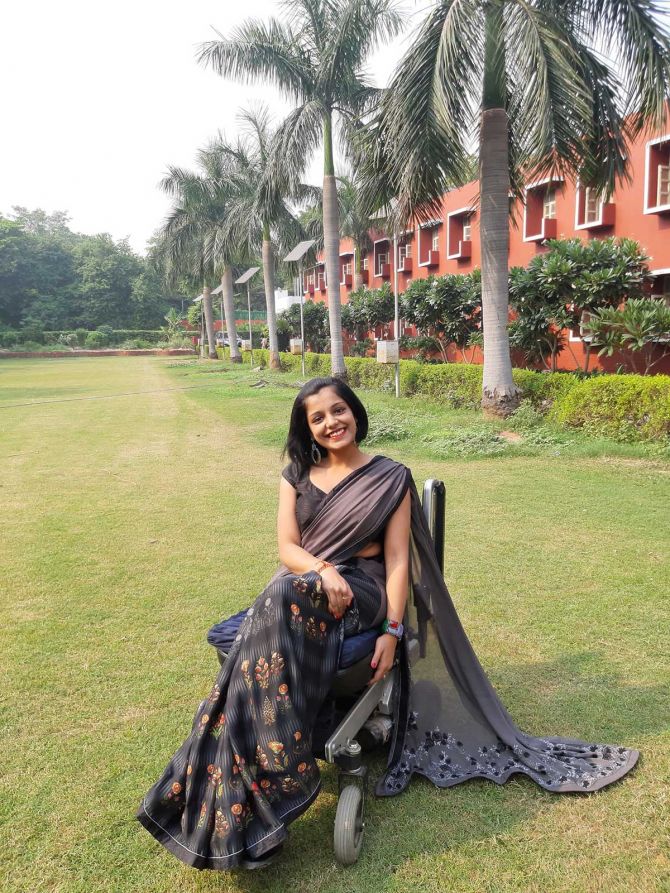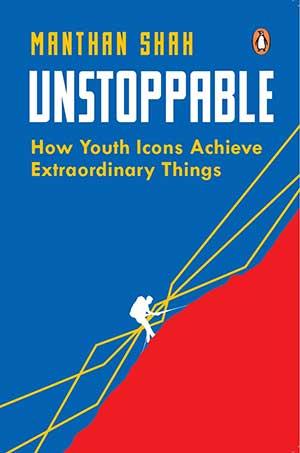Pratishtha Deveshwar learnt to reframe her anguish into an opportunity for action.
She felt that God had given her an opportunity to make an impact on the wider world.
An extraordinary excerpt from Manthan Shah’s Unstoppable: How Youth Icons Achieve Extraordinary Things.
Pratishtha Deveshwar is the first wheelchair user from India to study at the University of Oxford, and she is the recipient of the prestigious Diana award (one of the world’s most prestigious accolades that youth under the age of twenty-five can get for social work), an ambassador for the campaign appointed by the government and a TEDx speaker.
She overcame many personal obstacles to become a beacon of hope for girls from the rural areas in Punjab to the cities of London and Hong Kong.
Pratishtha was born in Hoshiarpur, Punjab, in 1998. She was a happy, outspoken and studious child.
One evening, when she was thirteen, she met with a serious accident. Half her body was paralysed.
With an only 3 per cent chance of ever walking again, it was a lot to process.
For the next five years, from 2011 to 2016, she was completely bedridden. She had to stop going to school and lose out on her social life.
School and the public places are largely inaccessible for a person with disability.
The disrespectful and stereotypical attitude that the society had towards people with disability affected her self-esteem and hampered her growth in those early years.
Imagine the frustration of not being able to move even your toes. The helplessness you feel when you are thirsty, and the glass of water is kept on the table right across your bed, but you can’t reach it.
You try and you fall only to injure yourself.
As a person with a disability, wherever she went in the society, she was challenged with the lack of accessible infrastructure.
These early experiences made her question the lack of inclusion in the world and set her on a path to do something about it.
For a long time, Pratishtha had a fundamental longing to get her old self back.
In her time of adversity, when everyone–her doctors, physiotherapists, and government–failed to give her a ray of light, she found her solace in prayers, meditation and journaling.
She says, ‘I would write to God saying that you have deprived me of the social life of a teen. I would then detail my dreams and aspirations of what I would want to do if I got my old self back.’
One day when Pratishtha was feeling particularly dejected, her father told her a story from the Indian epic Ramayana that helped her see opportunity in her adversity.
The day before the coronation of Sri Ram, his father, the king, sent him on a fourteen-year exile.
His mother, Queen Kaushalya, was heartbroken, but Sri Ram kept his calm and composure.
He smiled and said, ‘Father was going to make me the king of our great kingdom. But now he has made me the king of the whole jungle and there is so much more opportunity for me to work there and bring about a change.’
Much like this story, Pratishtha learnt to reframe her anguish into an opportunity for action. She felt that God had given her an opportunity to make an impact on the wider world.
For several years after her accident, it was hard for her to share her story with other people.
She did not want people to see her flaws, her scars or see her in the wheelchair because of lack of societal acceptance of people with disabilities and the prejudice that comes along with it.
One day, her parents were going out for a get-together, and she asked herself how long she would hide away from the world just because she was a bit different.
She decided that this fact wouldn’t stop her from living her life to the fullest.
Pratishtha recalls, ‘I started accepting myself and embracing the fact that okay, this is my identity now, and I don’t have to hide anymore.
‘Accepting my imperfections and focusing on my abilities has been my biggest accomplishment.’
That was when she decided to get out of the house in a wheelchair.
Having topped her class in the eleventh and twelfth standards, and with the encouragement of an angel-figure, she applied to Lady Sri Ram College, Delhi University, on the last day of applications. She got in. And she went.
The next three years at Lady Sri Ram College transformed her life completely.
From learning how to live independently to becoming a feisty voice advocating for inclusion internationally, her prayers had been answered.
She started sharing her story and soon realized the power of it. It had a tremendous impact on people.
Most people think that happiness comes from the people around them, their circumstances, their family background or material riches and success.
Pratishtha believes that happiness comes from appreciating the small things in life.
Happiness comes from an intrinsic confidence in oneself, so when you ask yourself what is the worst that can happen, your answer will be that come what may, I will survive it.
She says, ‘I had never even gone out with a friend to have a cup of coffee in my life, something most people do daily.
‘And now that I am finally able to do it too, along with many other things that people take for granted, I feel immensely happy, grateful and content.’
In the two-hour call for this interview, I learnt a lot about Pratishtha.
She has the candidness of a young girl, but it is backed by an Olympic-level confidence. Her confidence and sense of hope come from a very deep-rooted experience.
When she was much younger, her doctors and parents would often tell her all the things she could not and should not do.
It became very difficult for her to find her own voice. But she developed the habit of writing in her journal, which came in exceptionally handy for her to realize her self-worth.
She would write down her thoughts every day, and the journal became her most trusted and reliable friend and helped her get rid of all her negativity.
In 2020, Pratishtha demonstrated that nothing is impossible for those who are courageous in the face of adversity by becoming the first wheelchair-user from India to study at University of Oxford.
At the age of twenty-one, she smashed all the stereotypes that the society imposed on her growing up.
She overcame various hurdles of inaccessibility and exclusion to pursue a master’s degree in public policy from Oxford.
She was the youngest person in her class, where most students were thirty-five or above.
There can come a point in your life when you feel you are close to breaking. In that moment, if you see somebody who refuses to give up, it changes things for you.
This is the inspiration Pratishtha has been for me, and for many of the young people she has spoken to on her journey.
In July 2020, as an ambassador of the Beti Bachao Beti Padhao campaign, she addressed a group of tenth standard district topper girls from the rural areas of Punjab.
After her speech, Pratishtha realized that these top-scoring girls did not have their own dreams.
They were dependent on their parents to show them the way after they completed school too.
They did not even have the hope for a future that they could prosper in.
Because of her disability, she could resonate with girls who thought they were only good enough to stay at home and eventually get married.
She reflected on her own life story and inspired them by saying, ‘I am so much more than what people have thought about me and my capabilities.
‘You too can dream big and live a life much beyond what society expects of you.’
For a girl with a disability who was dependent on her mother for everything, from combing her hair to bathing to moving, for someone with no visible future, to go on to speak at international forums, work for disability rights and inclusion and study at Oxford would have been unimaginable.
So how did she do it?
‘Thoughts are things. If you can dream it, you can be it! All it takes is hard work, grit, courage and hope,’ she says.
Now that her inspiring journey is internationally recognized, she gets a lot of opportunities to impact lives of people.
She advocates for inclusion, mental health and disability rights at platforms big and small, public and personal in an attempt to ignite a ray of hope in every life she touches.
She says, ‘My story is now ten years long, and it is a journey long enough for people to see and understand that no matter how now feels like, their tomorrow is going to be much better.’
This edited excerpt from Unstoppable: How Youth Icons Achieve Extraordinary Things by Manthan Shah has been used with the kind permission of the publishers, Penguin publications India.
Feature Presentation: Ashish Narsale/Rediff.com
Source: Read Full Article











